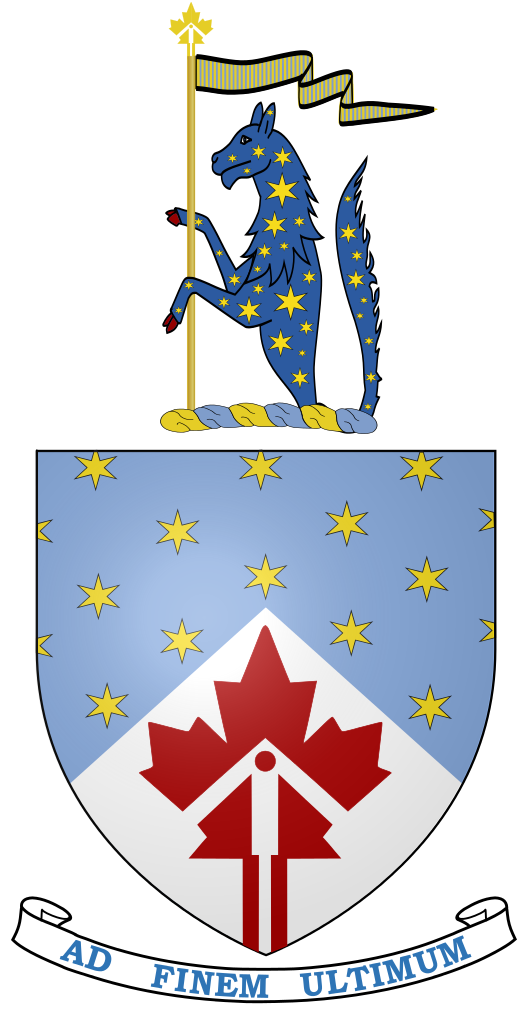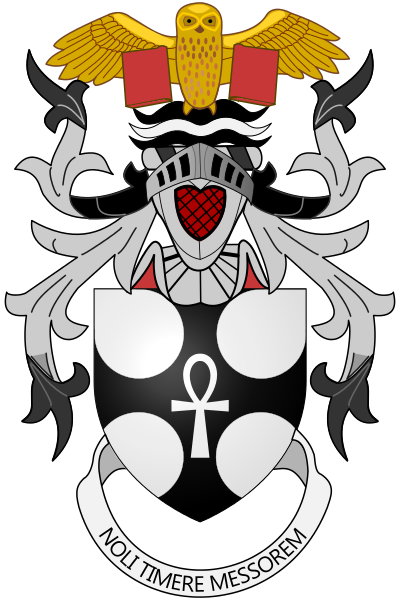The official motto of the Canadian Space Agency (associated with its coat of arms granted in 1991) is ad finem ultimum. This is usually officially translated as "to the ultimate end," which is certainly the most obvious translation of the phrase, and the one given in the official register of arms, flags and badges. But unlike the mottos of many other government agencies, it's not immediately clear how this motto in particular represents the space agency's mission.

However, there is another interpretation of the motto that makes a bit more sense. The word finem refers to a limit or boundary; in particular, it's commonly used to describe the borders (i.e. frontiers) of a country. And since ultimum simply means "final," one could argue that ad finem ultimum is better translated as "to the final frontier."
So, does the Latin motto of the CSA contain a deliberate reference to Star Trek? It sure seems like it. After some digging, I was eventually able to find an interview with the former Chief Herald of Canada which states that "The space agency's Latin motto, Ad finem ultimum, is borrowed from Star Trek: 'Towards the final frontier.'"
This is interesting in part because, despite some extensive searching, I've only been able to find a couple other official Latin mottos containing similar pop culture references, which I might as well list here.
Noli Timere Messorem

The author Terry Pratchett's coat of arms3 bears the motto noli timere messorem4, meaning "Don't Fear the Reaper." This is fitting not only because of Pratchett's advocacy for assisted suicide but also because of his highly iconic and sympathetic portrayal of the character Death throughout his Discworld novels.
Amore Solum Opus Est
George Martin, about whom Paul McCartney stated "If anyone earned the title of the fifth Beatle, it was George," was granted a coat of arms5 bearing the motto amore solum opus est, which can be translated as "All You Need Is Love."
Ecce Cor Meum
Speaking of Paul McCartney, he also has arms6 bearing the motto ecce cor meum ("behold my heart"), which is also the title of an album of his. This one is kinda cheating, though, because it looks like McCartney adopted the motto and started work on the album at around the same time.
Ad Proximum Ventum Pistrinum
Here's another Canadian example. Major-General Richard Rohmer's coat of arms contains the motto ad proximum ventum pistrinum, officially translated as "on to the next windmill,"7 in reference to Don Quixote. I guess this isn't really a "pop culture reference," but I'm trying to stretch this concept to justify a blog post, ok?
Also, if this article is to be believed, Rohmer originally wanted a Latin translation of "always in the shit," but apparently even Canada's wacky heraldic authority has its limits.
Assorted Puns
I can't talk about interesting Latin mottos without mentioning the long history of silly puns on people's names. For instance, the motto of Baron Vernon is ver non semper viret ("spring is not always green"), which could also be read as vernon semper viret ("Vernon always flourishes").
In a less contrived example, the well-known saying festina lente ("hurry slowly") has been adopted by, among others, the Onslow family.
And here's one more Canadian example: Sir Louis-Hippolyte La Fontaine's arms bear the motto fons et origo, a common phrase meaning "the source and origin." In this case, it's also a pun on his name, since fons is also translated as "fountain."
Sic Iterum Ad Astra
Finally, here's a fun Latin motto that I can take credit8 for.
In 2019, the UVic Rocketry team headed to the Spaceport America Cup to launch our rocket Hyak-2. This was our second attempt at a rocket in the 30,000 ft category, with the first (Hyak-1) having failed completely. So when we decided to order mission patches, I thought a fitting motto would be sic iterum ad astra.

This is a reference to the well-known Latin motto sic itur ad astra, meaning "thus one goes to the stars." It's a quote from the Aeneid, used as the motto of the Royal Canadian Air Force (among other institutions). But by changing iter to iterum, the meaning becomes "thus, a second time, to the stars."
In the end, Hyak-2 turned out to be a faithful successor to Hyak-1, in that it also failed.
- Image by Wikimedia Commons user A1 Aardvark ([link](https://commons.wikimedia.org/wiki/File:Canadian_Space_Agency_Coat_of_Arms.svg)), licensed [CC BY-SA 3.0](https://creativecommons.org/licenses/by-sa/3.0/deed.en). ↩
- Image by Wikimedia Commons user Maxxl2 ([link](https://commons.wikimedia.org/wiki/File:Terry_Pratchett_COA.svg)), licensed [CC BY-SA 4.0](https://creativecommons.org/licenses/by-sa/4.0/). ↩
- Prominently featuring an ankh, in reference to the fictional city of Ankh-Morpork. There is also an owl, which presumably is a morepork. ↩
- Although, strictly speaking, in English heraldry the motto is not a part of the grant of arms, and can be changed at will. ↩
- Featuring a house martin, as well as some beatles. ↩
- Designed to resemble a guitar, and also featuring a blackbird in the crest. ↩
- Although I haven't been able to find any other uses of the phrase ventum pistrinum, which appears to just be a word-for-word translation of "wind mill." It seems that ventimola or ventimolina would have been better. ↩
- Or blame... ↩